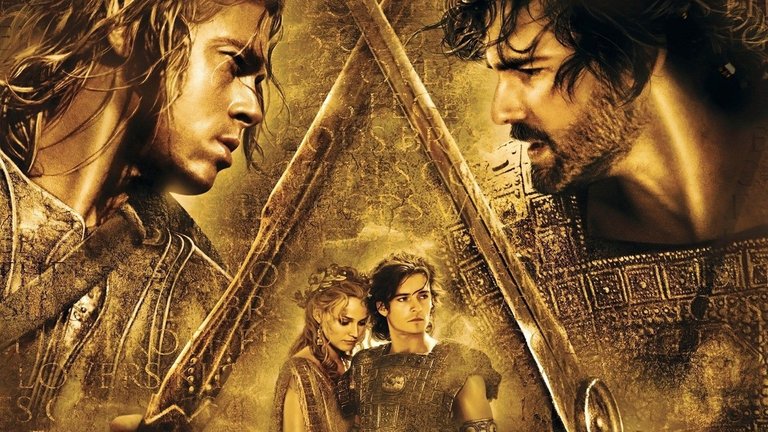Film Review: Troy (2004)

Certain sections of the world’s public were recently appalled by the results of a survey suggesting that one fifth of US Zoomers didn’t believe that the Holocaust had ever happened. A long debate can be held about the reasons for that, but most of them would revolve around little or no knowledge of history, with the perception of the distant past often framed by Hollywood films that sacrifice facts for the sake of entertainment, ideology, or both. One such example is the way ancient European history was treated in Troy, a 2004 epic directed by Wolfgang Petersen.
The film is based on the ancient Greek myths about the Trojan War, most famously described in the Iliad, an 8th-century BC epic poem attributed to Homer, the very first major work of Western literature. The plot begins around 1200 BC when ancient Greece is a patchwork of city-states that are becoming united under Agamemnon (played by Brian Cox), King of Mycenae, who, in doing so, uses the services of Achilles (played by Brad Pitt), Greece’s greatest warrior. A delegation from Troy, a wealthy city-state on the eastern coast of the Aegean Sea, has come to Greece to negotiate a trade deal. Young and dashing prince Paris (played by Orlando Bloom) seduces Helen (played by Diane Kruger), wife of Menelaus (played by Brendan Gleeson), King of Sparta and Agamemnon’s brother, and takes her with him to Troy. This insult provides an excuse for Agamemnon to call for an all-Greek war against Troy, to which Achilles joins. The Greek army lands near the city, and Achilles captures the temple and its beautiful priestess Briseis (played by Rose Byrne). She is, however, taken as a prize by Agamemnon, which angers Achilles, who refuses to fight any more. Because of that, the Greeks aren’t able to advance and suffer terribly when confronted by the Trojans and their champion Hector (played by Eric Bana), son of King Priam (played by Peter O’Toole). Achilles’ cousin Patroclus (played by Garrett Hedlund) decides to take his armour and fight Hector.
Obviously inspired by the grand success of Gladiator, a film that showed that the “sword and sandal” subgenre of historical epics can find its audience in the 21st century, Troy was one of the most ambitious productions of its time, coinciding with Oliver Stone’s similarly themed Alexander. With nearly 200 million US dollars of budget, it was one of the most expensive Hollywood films until that time, and director Wolfgang Petersen, undeterred by difficulties and a series of minor disasters that prolonged the shoot, did a good job in showcasing all those resources on screen. Troy, helped by major sets, hundreds of extras, and CGI, effectively recreates the Bronze Age Aegean world and features some of the most spectacular combat scenes seen at the time. All that effort wasn’t in vain, at least initially. Reviews were mostly positive, and the audience flocked to the theatres, turning Troy into one of the big hits of its time. Much of the credit for that should go to Brad Pitt, who was at the height of his popularity at the time. He had worked on his physique well, trained hard to perform demanding combat scenes, and even appeared nude in scenes that would attract his female fan base. The rest of the cast also did a decent job, even when their roles were thankless, like the relatively unknown German actress Diane Kruger in the role of a woman whose face famously “launched a thousand ships.” Kruger didn’t have much to do with her role, but, thanks to Troy, she became a genuine international star. The same can be said for Australian actress Rose Byrne, who would also become a big Hollywood star in the next decade.
All that spectacle, however, did little to hide serious problems with Troy. Some of the flaws were unavoidable, due to the film being a mainstream Hollywood production and, as such, constrained by MPAA censorship standards, with an “R” rating, in a notoriously hypocritical fashion, allowing for plenty of violence and gore but preventing displays of female nudity, although sex and disputes over women were one of the main themes of the source material. At the end of the day, the main problem for Troy was the script by David Benioff, which took a rather interesting approach. Instead of following Homer and other Classical sources, the film tried to give a quasi-historical and, at least seemingly, more historic depiction of the Trojan War. Gods and supernatural elements were removed, but that apparently wasn’t enough for Benioff, who not only oversimplified characters, their motivations, and moral alignments but actually changed their ultimate fate. This not only made this film an intolerable sacrilege for anyone with the benefits of a Classical education, but actually made those characters weak and one-dimensional.
Troy, despite its initial success, failed to become a classic or particularly well-remembered piece of the genre. Bad opinions about the film were expressed almost instantly by Peter O’Toole, who stormed from the premiere, and Pitt later expressed his own reservations about the whole endeavour. Even Petersen admitted some of the flaws, at least judging by the 2007 Director’s Cut, which added thirty minutes of material, with more nudity and graphic violence. At least some lessons of Troy were learned by Benioff, who would a few years later become the creator of another, although fictional, epic in the form of Game of Thrones.
RATING: 4/10 (+)
Blog in Croatian https://draxblog.com
Blog in English https://draxreview.wordpress.com/
InLeo blog https://inleo.io/@drax.leo
InLeo: https://inleo.io/signup?referral=drax.leo
Unstoppable Domains: https://unstoppabledomains.com/?ref=3fc23fc42c1b417
Hiveonboard: https://hiveonboard.com?ref=drax y
Bitcoin Lightning HIVE donations: https://v4v.app/v1/lnurlp/qrcode/drax
Rising Star game: https://www.risingstargame.com?referrer=drax
1Inch: https://1inch.exchange/#/r/0x83823d8CCB74F828148258BB4457642124b1328e
BTC donations: 1EWxiMiP6iiG9rger3NuUSd6HByaxQWafG
ETH donations: 0xB305F144323b99e6f8b1d66f5D7DE78B498C32A7
Posted using CineTV